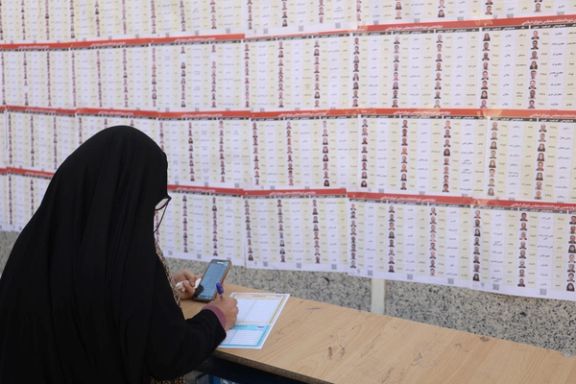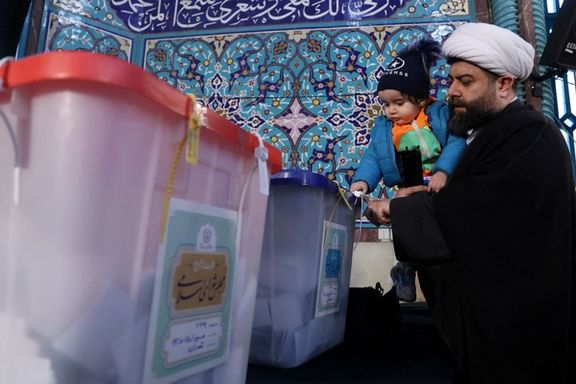Low Voter Turnout And High Blank Votes Mark Elections In Tehran

The initial outcomes of parliamentary elections in Iran's capital Tehran reveal an unprecedented boycott by a substantial portion of voters alongside a surge of invalid votes.

The initial outcomes of parliamentary elections in Iran's capital Tehran reveal an unprecedented boycott by a substantial portion of voters alongside a surge of invalid votes.
According to official statistics, 10 million people were eligible to vote in Tehran province. Mehr news agency, close to Iran’s hardliners, claimed a voter turnout of 24 percent in the capital, which means around 2.4 million participated in the elections.
However, according to the Interior Ministry’s preliminary list of the leading candidates in Tehran, the frontrunner, Mahmoud Nabavian, has only received 120,000 votes; that is, slightly more than 2% of the total votes. This figures can be taken to imply that either much less than 24% voted, or a large number of the electorate chose to cast invalid votes.
Tehran sends 30 members to parliament, while other constituencies each have their own share of seats. Candidates receiving the highest number of votes in each district fill the available slots.
In recent years, many Iranians have cast invalid votes as a means to express their dissatisfaction with the status quo. While the Iranian regime asserts that citizens are free to decide whether to participate in elections and that abstaining will not incur penalties, numerous reports suggest that the Islamic Republic closely monitors individuals' voting records, thus exerting significant control over their freedom of choice.
This process is particularly implemented for citizens holding a governmental position, such as teachers, university professors, and civil servants. According to reports, one of the key criteria to renew the contracts of the government employees or to grant them promotions is their voting records, which is construed by security and intelligence agencies as a sign of allegiance to the regime. Those who have to vote to keep their jobs express their discontent through invalid votes.

Back in 2021, the presidential elections witnessed the same voting strategy by dissenting citizens who cast more than 3.7 million invalid votes to protest regime policies. The significance of this number becomes apparent only when we notice that the second leading candidate then, Mohsen Rezaei, won only 3.4 million votes from 60 million eligible voters.
Italy-based political analyst Ehsan Soltani referred to the discrepancy between the official turnout and the number of valid votes in Tehran, and predicted, “The number of invalid votes might surprise everyone.”
He also noted that the 30th ranking candidate in the 2016 parliamentary elections in Tehran received more than a million votes while the frontrunner on Friday managed to get just 120,000, concluding that the regime has lost its legitimacy in the eyes of the citizens.
Even if we accept the government's claim of a 24% turnout in Tehran, this marks the lowest voter participation in the capital during the Islamic Republic's rule.
The invalid votes also played a major role in recent elections in Yazd, a conservative city in central Iran. The winning candidate in the city, Mohammad Saleh Jokar, was elected to the parliament with more than 81,000 votes while the second on the list was “invalid votes” with close to 30,000, around 10,000 votes more than the next top candidate, Ali Morteza Rad.
Another point of note about the preliminary results of the parliamentary elections in Tehran is that many hardliners are leading the list. The fact that these hardliners got elected with the their meager votes by not testify to their popularity in the capital. On the contrary, this is a clear sign that even many supporters of the regime abstained from voting in the elections due to their disillusionment. Most non-hardliners were barred from running by the ministry of interior and election watchdog, the Guardian Council.
Even former president Hassan Rouhani, former parliament speaker Ali Larijani and many other loyal regime insiders were barred from running in elections in 2021 and 2024.
Iranian regime media, including IRNA and the IRGC-affiliated Fars news website, claim a voter turnout of more than 40%, the lowest in the history of the Islamic Republic. However, social media accounts offer a contrasting narrative through videos and images, indicating much lower participation.
Former reformist lawmaker Mahmoud Sadeghi taunted the celebratory rhetoric by many governmental media regarding the claimed 40% turnout. “In the previous parliamentary elections (2020), they said that only 42.5% voted because of the Covid pandemic; now that the turnout is even less, they pretend it is a victory for them!” he wrote on X.